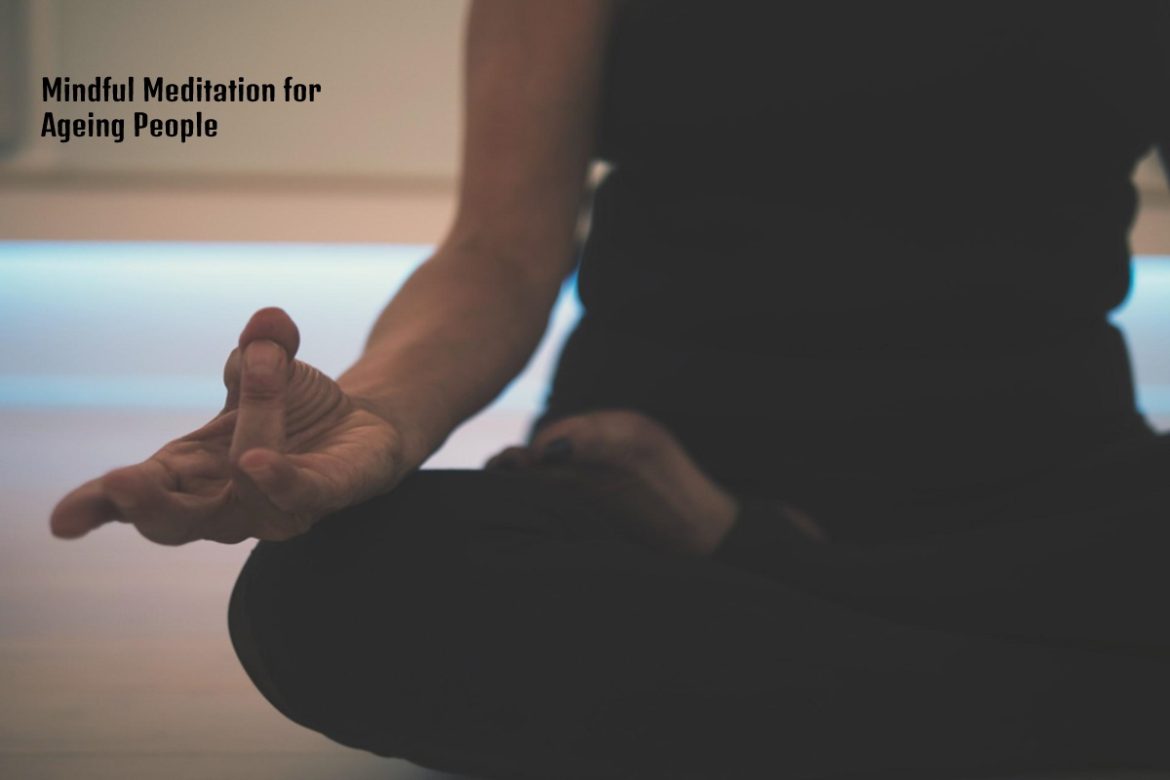Mindful Meditation for Ageing People – You’ve probably heard the term “mindfulness,” but what exactly does it mean, and how can it benefit the health of ageing people?
What Mindfulness Means
Although mindfulness emerged centuries ago from Buddhist traditions and is still practiced by Buddhists today, you don’t have to be a Buddhist to practice mindfulness. There are secular forms of mindfulness today, and they vary widely.
Generally, however, mindfulness means paying attention to our thoughts and bodily sensations without judging them, without thinking “that is good” and “that is bad,” or “that feels good” and “that feels bad.” You do not try to think about the past or worry about the future, near or distant. Instead, you accept yourself—your mind, body, etc.—as it is in the present moment.
When you practice mindfulness, you practice acceptance. You accept who you are, who other people are, and, more generally, life as it is.
If that sounds both simple and impossible, well, it is. We can never entirely stop judging our thoughts and feelings, nor can we ever focus purely on the moment.
But we certainly can get better and better at being mindful with practice. That is, we can over time get better at cutting out mental chatter and racing thoughts—what some Buddhists call “the monkey brain”—and feeling calmer, less judgemental, and more at home in the present.
Mindfulness is a practice of self-acceptance. With mindfulness, we view ourselves through a non-judgmental, nurturing lens.
Choosing an assisted living home that offers meditation classes has been proven to enhance the lives. When you are looking for a retirement home, one should consider a home that offers such classes.
Health Benefits of Mindfulness for Aging People
For ageing people willing to sit for minutes and even hours at a time, meditation and other mindfulness exercises can be excellent for mental, physical, and emotional health.
Meditation classes and groups are offered at state-of-the-art senior living retirement homes for a reason. Research has shown that meditation can help with attention span, memory, stress, anxiety, depression, chronic pain, hypertension, insomnia, and diabetes.
Mindful meditation is one form of meditation, which itself is one of many mindfulness exercises. When practising mindful meditation, the primary goal is to pay attention to your breath as you breathe in and out. Doing so helps you anchor yourself in the present.
You can meditate in different positions—sitting on the floor or a chair, lying on a bed or leaning against a wall. No position is better than another. What’s important is that you pick the position that’s most comfortable for you.
If it helps, you can try counting your breath. For instance, you can breathe in for 4 seconds, hold your breath for 5 seconds, and breathe out for 7 seconds. Breathing in through the nose and out through the mouth works well for many people.
Even experienced mindfulness meditators are often surprised by how easily they get distracted from their breath, so it’s natural—indeed, it’s expected—that you won’t be able to focus purely on your breath. The mind wanders. That’s how it works.
Instead of thinking of meditation as an intense exercise in concentration, it’s better to think of it as a gentle practice of reminding yourself when your mind starts to wander and returning your mind to your breath.
Mindful meditation takes patience, of course. What you may find when you practice mindful meditation is that it improves your patience both with yourself and with others.
More Health Benefits:
- When you’re first starting to practice mindfulness meditation, try setting a time limit for a short amount of time, like five to ten minutes. If you know you won’t be breathing in and out for very long, you’ll feel more patient.
- When your mind does wander, that’s okay. Don’t judge yourself.
- When you finish your session, open your eyes slowly, pay close attention to your thoughts, how you’re feeling, and where you are.
- Chances are that after as little as five minutes of meditating, you’ll feel more at peace than when you began.


